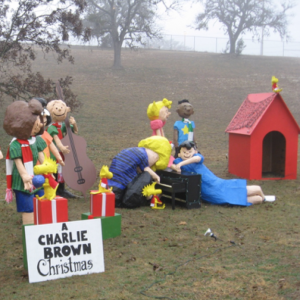Forensic Psychiatric Hospital: Music Therapy & Art Therapy
The unique goals of court-committed adults are being addressed in interesting ways by the team of music therapist Alison Etter and art therapist Jaimie Peterson in a forensic psychiatric hospital. In this AMTA-Pro podcast, Etter and Peterson describe a number of creative collaborative interventions giving their clients opportunities to be involved in a performances, exhibits, broadcasts, and publications. The wide-ranging and diverse therapeutic experiences are designed to increase personal connections, reduce stigma, encourage interaction and communication, facilitate leadership and cooperation, and provide opportunities for creative expression through music and art.
[display_podcast]
Forensic Psychiatric Hospital: Music Therapy & Art Therapy
Alison Etter, MT-BC and Jaimie Peterson, MAAT, ATR
AMTA-Pro Podcast July, 2016
— + —
 Alison Etter, MT-BC received a Bachelor of Music in Music Therapy from Southern Methodist University and completed her clinical internship at San Antonio State Hospital. She is currently working towards a Master’s in Music Therapy at Colorado State University. She has worked at Kerrville State Hospital for over 4 years. She represents the Southwestern region on the AMTA Technology Committee and has served for 2 years. In 2014 she received the Harmony award for Clinical Practice from SWAMTA. Presentations include: Texas Forensic Networking Conference, Central Texas Music Therapy Association conference, SWAMTA conference, and the AMTA conference.
Alison Etter, MT-BC received a Bachelor of Music in Music Therapy from Southern Methodist University and completed her clinical internship at San Antonio State Hospital. She is currently working towards a Master’s in Music Therapy at Colorado State University. She has worked at Kerrville State Hospital for over 4 years. She represents the Southwestern region on the AMTA Technology Committee and has served for 2 years. In 2014 she received the Harmony award for Clinical Practice from SWAMTA. Presentations include: Texas Forensic Networking Conference, Central Texas Music Therapy Association conference, SWAMTA conference, and the AMTA conference.
Jaimie Peterson, MAAT, ATR received her BFA in Painting from the Kansas City Art Institute and her MAAT at the School of the Art Institute of Chicago. She has worked at Kerrville State Hospital for over 6 years. Her master’s thesis on the art of Vietnam Veterans was exhibited at the Betty Rymer at the Art Institute of Chicago, the National Veterans Art Museum, and presented at the Gene Siskel Theater. Jaimie is also the chair of the Art Committee for AATA. She was presented with the Friends of Music Therapy Award in 2015 by SWAMTA. Presentations include: Texas Forensic Networking Conference, AATA national conference, the Illinois Art Therapy conference, Central Texas Music Therapy Association conference, SWAMTA conference, and the AMTA conference.
References
Borofsky, A.R.H. (2012, November 14). Live from the inside: A radio show run by psychiatric patients. The Atlantic. Retrieved from http://www.theatlantic.com/health/archive/2012/11/live-from-the-inside-a-radio-show-run-by-psychiatric-patients/265199/
Cleary, M., Deacon, M., Jackson, D., Andrew, S., & Chan, S.(2012). Stigma in mental illness: A continuing concern. Contemporary Nurse: A Journal for the Australian Nursing Profession, 40(1), 48-50.
Frances Johanna Morris & Mallori Willis-Rauch (2014) Join the Art Club: Exploring Social Empowerment in Art Therapy, Art Therapy: Journal of the American Art Therapy Association, 31(1), 28-36.
Horfsfall, J.m Cleary, M., & Hunt, G. E. (2010). Stigma in mental health: Clients and professionals. Issues in Mental Health Nursing, 31(7), 450-455.
Howells V., Zelnik, T. (2009). Making art: A qualitative study of personal and group transformation in a community arts studio. Psychiatric Rehabilitation Journal, 32(3), 215-222.
Moon, C. H. (2002). Studio art therapy: Cultivating the artist identity in the art therapist. Philadelphia, PA: Jessica Kingsley.
Morris, F.J., Willis-Rauch, M. (2014). Join the art club: Exploring social empowerment in art therapy. Art Therapy: Journal of the American Art Therapy Association, 31:1, 28-36.
Soshensky, R. (2011). Everybody is a star: Recording, performing, and community music therapy. Music Therapy Perspectives, 29(1), 23-30.
Van Llith, T. (2014). “Painting to find my spirit”: Art making as the vehicle to find meaning and connection in the mental health recovery process. Journal of Spirituality in Mental Health, 16(1), 19-36.
Van Lith, T., Fenner, P., & Schofield, M. (2009). Toward an understanding of how art making can facilitate mental health recovery. Australian e-Journal for the Advancement of Mental Health, 8(2), 183-193.
Vick, R. (2011). Ethics on exhibit. Art Therapy: Journal of the American Art Therapy Association, 28:4, 152-158.
Wolfensberger, W. (2000). A brief overview of social role valorization. Mental Retardation, 38(2), 105-123.

